(Note: If you haven’t read it yet, my introductory post on this Star Trek: The Original Series rewatch is a good place to start.)
Original Air Date: January 12, 1968
Crew Death Count: 0 (but one member of the Okmyx gang is killed by gunfire and several Iotian bystanders appear to be killed, also)
Bellybuttons: 0
When I was in grade school, a very long time ago, a friend and I taught some of our less enlightened classmates a card game called fizzbin. We had to ad-lib a few rules to have a complete game, but ad-libbing is what fizzbin, and “A Piece of the Action,” are all about. As an added bonus, unlike “The Alternative Factor,” this episode is supposed to be funny. This week the Enterprise travels to Sigma Iotia II in response to a one-hundred-year-old radio message from the long-lost spaceship Horizon. It appears the Horizon visited this planet and left behind a book on Chicago gangsters of the 1920s. The Iotians, being what Spock calls “extremely intelligent and somewhat imitative,” turned the gangster book into something of a bible and developed into a society of feuding crime families, where everyone packs a gun and citizens double-cross each other for material gain. Sort of like twenty-first century America. Soon the landing party of Kirk, Spock, and McCoy find themselves trying to outwit amateur Al Capones and correct the planetary “contamination” caused by the Horizon.
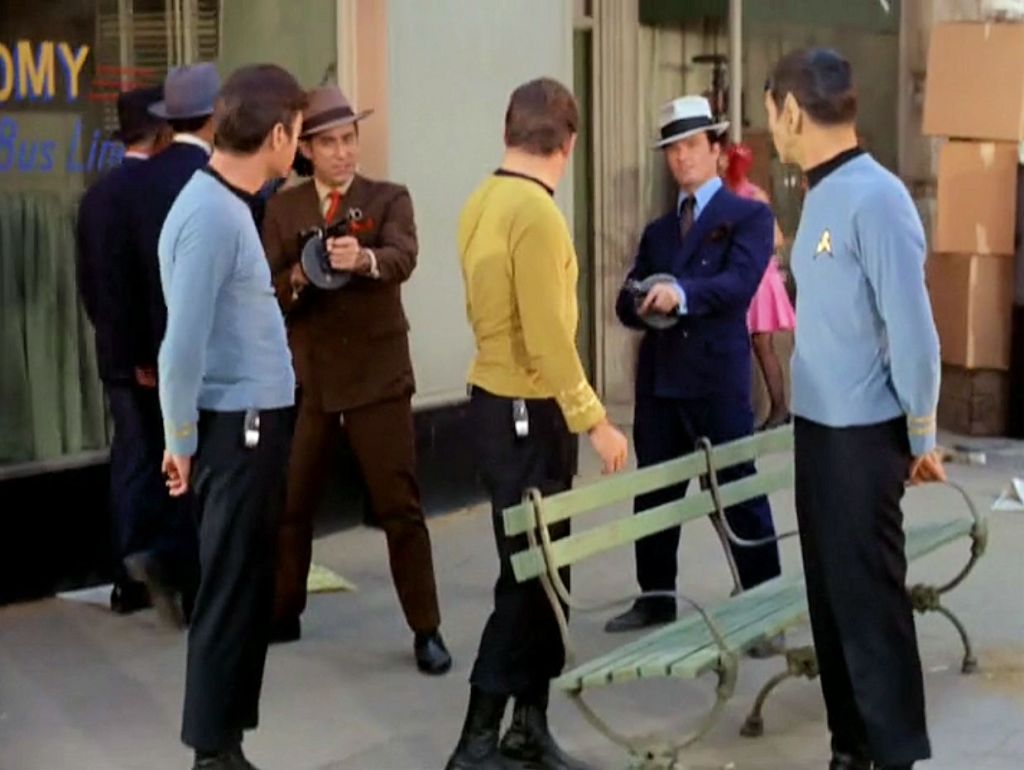
In “A Piece of the Action,” the Federation continues its tradition of hundred-year follow-ups established in “The Return of the Archons.” We’re given a half-hearted explanation that the Federation only recently received the Horizon’s report because it was broadcast with conventional radio. This doesn’t explain why no one in the Federation suggested returning to that planet the Horizon visited all those years ago. True fans may appreciate part of the Horizon’s backstory being filled in by the Enterprise season two episode “Horizon” (with a slight mis-match in the book’s title).

The episode that I enjoyed so much as a child doesn’t hold up as well for adults, but it does demonstrate the consequences of violating the Prime Directive. Like a ship turned slightly off course, given enough time a small influence can cause substantial change. Kirk reports that Sigma Iotia II was at the “beginnings of industrialization” when the Horizon arrived. We only see one city and it looks suspiciously like Edith Keeler’s hometown from “The City On the Edge of Forever,” which might explain how Kirk and Spock seem to know so much about early twentieth century Chicago. Two crime bosses, Okmyx (Anthony Caruso) and Krako (Vic Tayback), compete for control of the action, but we briefly meet a third boss, Tepo (John Harmon), with Okmyx claiming a total of “a dozen or so” bosses. Nearly every adult Iotian carries a gun and appears ready to use it, so it’s hard to understand why so many remain apparent civilians subservient to the crime gangs. Citizens pay a fee to the bosses of their respective area and receive basic services and protection in return. While we don’t see the full chaos expected from such a situation, more than one character describes Iotian society exactly that way. Even Spock says, “We may quarrel with Mr. Okmyx’ methods, but his goal is essentially the correct one. This society must be united or it will degenerate into total anarchy.” All this anarchy is the result of Iotians’ “somewhat imitative” nature and the presence of the aforementioned book on 1920s gangsters. “The book tells us how to handle things,” Krako says. How could an entire planet be so heavily influenced by a single book, we might ask?

Sigma Iotia II has essentially been taken over by religious fundamentalism. The Iotians refer to the gangster tome as “the Book,” and our crew’s use of the word “contamination” is no accident. The Christian Bible is the obvious comparison, since there are more Christians in the world, well over two billion, than any other religion. (Or non-religion. Christians are followed, in population numbers, by Islam, atheism/agnosticism, Hinduism, and Buddhism. This is taken from Wikipedia, so the specific numbers may be off, but the relative proportions seem reasonable.) The “Bible” consists of the Old Testament and New Testament, which are very different in tone and teachings. The Old Testament is taken primarily from the Hebrew Tanakh and establishes the Judeochristian god as the only god who should be worshiped, while the New Testament abruptly turns God into a trinity and presents the teachings of God’s son who is also God. Various sections of the Bible derive from wildly different sources writing at different time periods and have been translated, re-translated, and mis-translated (both accidentally and deliberately) numerous times. They also draw heavily from prior traditions and practices. Even Christians disagree as to how seriously to take the Bible. So when we report the existence of over two billion Christians in the world, we’re talking about a highly diverse group, some of whom have been heavily influenced by the Bible, others of whom have not. Some use the Bible to justify taking up arms against all who disagree with them, others use it as a message of peace and fellowship. Some “discover” the Bible late in life, others are born into the tradition but reject it in adulthood.
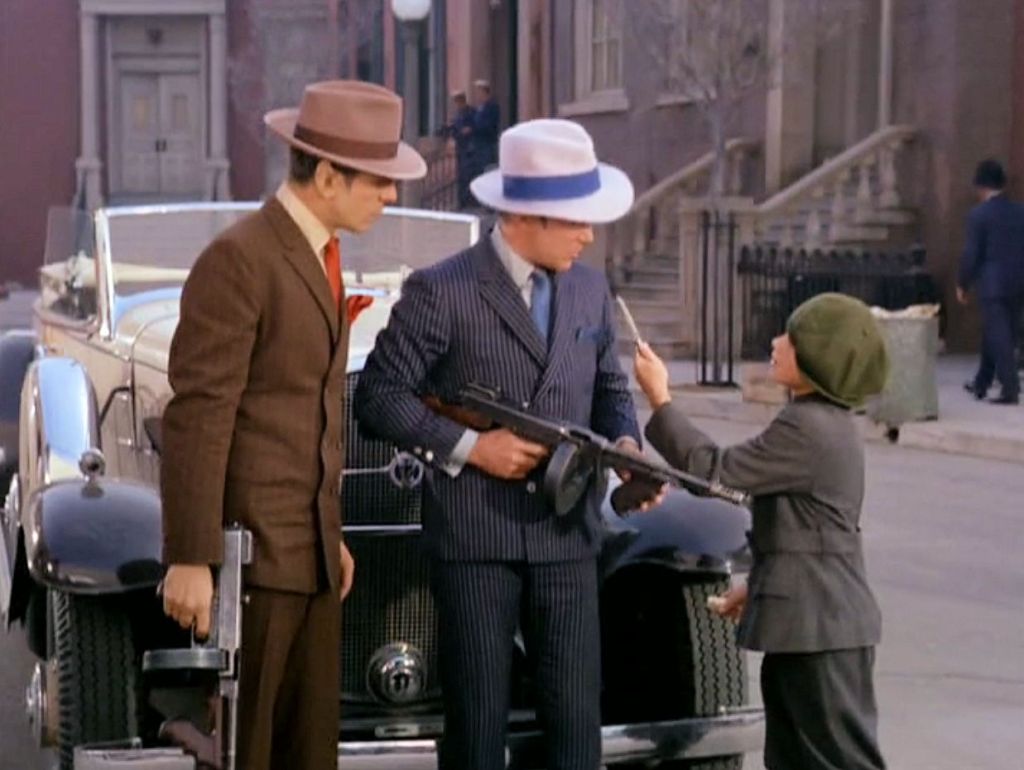
So while our world has been heavily influenced by one book, that book has taken many forms over the centuries and the nature of its influence has been inconsistent, at best. And some of that influence is not the result of the book itself, but individuals proselytizing for their own ends. This leaves our original question unanswered: How could Sigma Iotia II have been so dramatically influenced by one book? Okmyx informs us the Horizon left other books besides the volume on gangster history. We know the Iotians have other books, because we see some in Krako’s office. So this particular book should not have been a revelation (get it?) to the Iotians. Translation challenges aside, it’s impossible to believe all Iotians would have been united in their interpretation of the book’s content. I suppose this could explain why all the citizens carry guns but are still willing to serve one or the other boss, like congregants in competing churches, but the logistics of the entire scenario are still problematic. We may just have to accept the Shatnerian wisdom that, “for crying out loud, it’s just a TV show.”
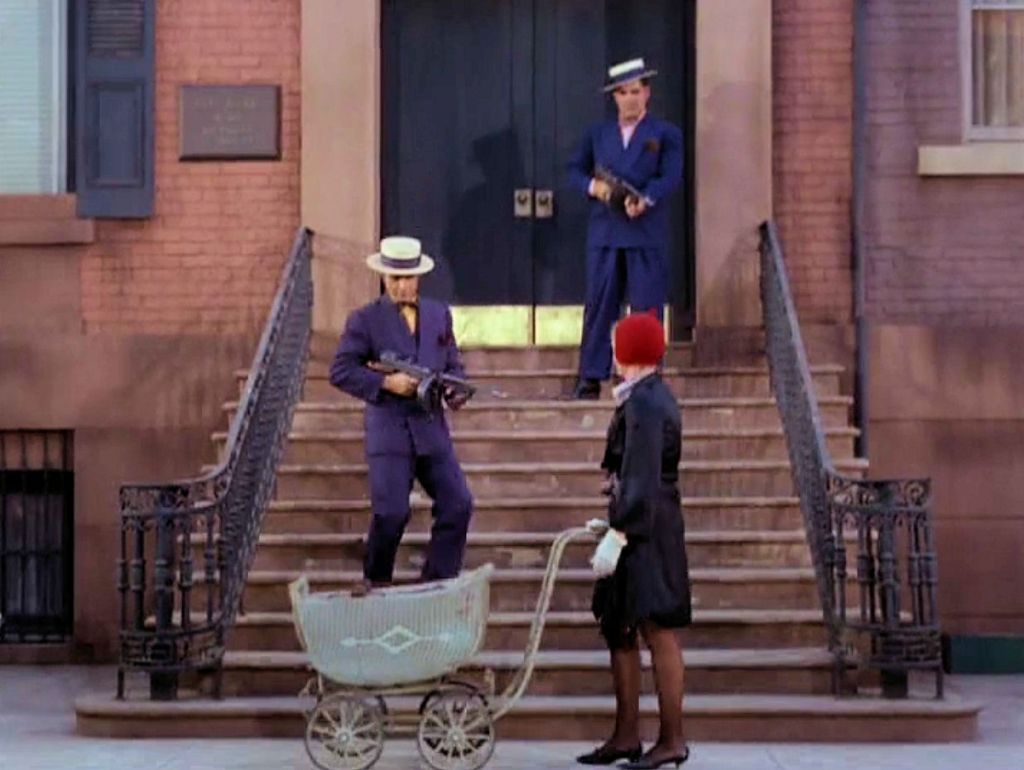
The Enterprise crew’s desire to “correct” the society’s “contamination” doesn’t clarify matters much. Even if they weren’t already heading down the gangster path before the Horizon’s visit, the Iotians have been on this track for at least a century. It’s foolish for Kirk and company to think they can reset the clock by a hundred years. Kirk’s final solution isn’t a solution at all: Okmyx remains in charge with Krako his second in command. The planet is still ruled by gangsters! The Federation will visit Sigma Iotia II every year to collect 40% of “the action,” but we have no idea what that is. Has Kirk really entered the Federation into a contract to collect 40% of this society’s entire gross output? Or will Okmyx continue operating a protection racket and give “the Feds” 40% of his ill-gotten gains? The prospects are not so funny when you consider the finer points.
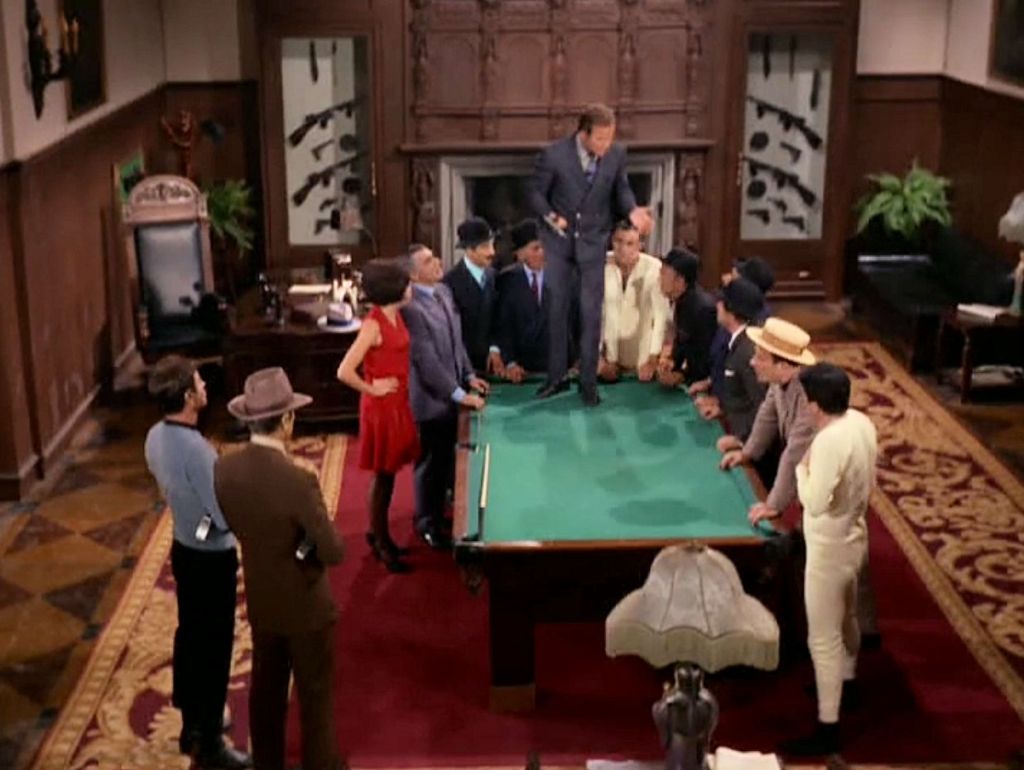
That attempt at humor is what makes me most uncomfortable about “A Piece of the Action.” Yes, the episode is entertaining, particularly the clever scene of Kirk distracting his captors by teaching them the made-up card game of fizzbin. Anthony Caruso and Vic Tayback are very good in their respective roles. And Mr. Scott has some fine moments that help us forget his raping and pillaging from recent episodes. Why is it okay to joke about poisoning a food supply in “The Trouble with Tribbles” but not criminals with guns in this episode? Maybe it’s because, despite its real world applications, “The Trouble with Tribbles” remained entirely in the realm of science-fiction, while elements of “A Piece of the Action” cut too close to home. Are all those Iotians safer for carrying guns? As of 2017, the United States’ 326 million citizens owned 393 million firearms. That same year, over 39,000 Americans died by firearms, with the vast majority a result of homicide or suicide. Of course, we can’t blame TOS for today’s state of affairs, so what of the time and place depicted in the episode? Chicago in the early 20th century was a mixed bag of progress and chaos. The Great Migration inspired the Chicago Black Renaissance of the 1930s and ‘40s, helping elevate Louis Armstrong, Mahalia Jackson, Richard Wright, and many others to fame. At the same time, Prohibition encouraged the rise of the very gangsters parodied in “A Piece of the Action,” like Al Capone and Bugs Moran. Capone is believed responsible for the Saint Valentine’s Day Massacre in Chicago’s Lincoln Park in 1929. These criminals were not the caricatures depicted in “A Piece of the Action,” but dangerous men who escalated the level of violence in American cities. And they met ends suitable to their cold-hearted lives: Moran died of lung cancer in Leavenworth Federal Prison and Capone died of heart failure after years of suffering syphilis-induced paresis.

Our crew’s conduct ranges from reliable to clumsy. Kirk and Spock manage to pick up the gangsters’ jargon to an extent that is hit-or-miss in terms of entertainment value. Kirk’s crime boss voice sounds like Kevin Pollak impersonating Captain Kirk. Their immediate semi-mastery of internal combustion engine automobiles is nonsensical – I’ve been driving cars for more than thirty years, and Kirk and Spock know more about driving a manual transmission than I do. Like “The Alternative Factor,” the episode’s frequent shifts from planet to ship and back feel like padding to make up for the lack of a complete story. (Also like “The Alternative Factor,” this episode involves a kind of alternate reality.) The most grievous error (other than Kirk’s 40% arrangement) is Spock’s decision to trust Okmyx after he and McCoy manage to escape to the Enterprise. Spock even acknowledges he shouldn’t trust Okmyx, but he immediately does just that based solely on a half-hearted assurance from the career criminal. When Spock and McCoy beam down, without even a single security officer, they are immediately taken captive. Of course, given the Enterprise security team’s past performance, maybe Spock thought they were better left behind. A more sophisticated version of this story, with more competent crew behavior, is told in the season three Voyager episode “False Profits.”
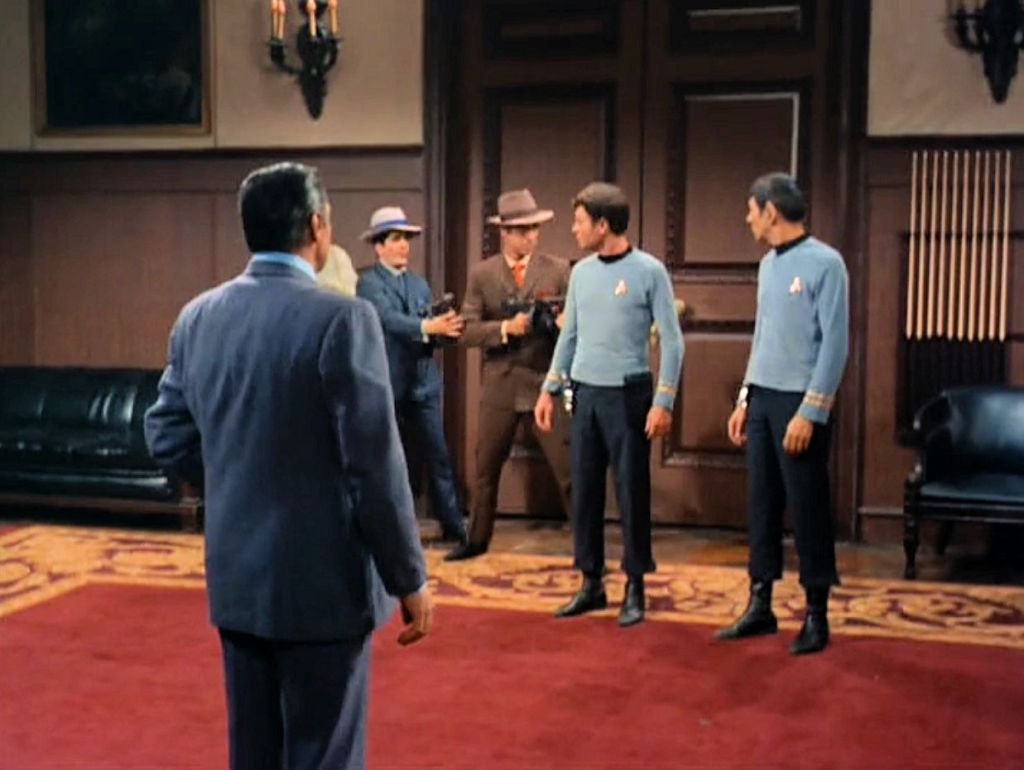
My earlier comparison to present-day United States wasn’t made casually. Throughout the episode the characters describe contemporary life. Okmyx describes capitalist philosophy when he says, “Nobody helps nobody but himself,” and later expresses fatigue with the very system he helps perpetuate, saying, “I’m sick and tired of all these hits.” Spock, when attempts to reason with both Okmyx and Krako fail, says, “Logic and practical information do not seem to apply here.” Finally, Kirk himself perfectly summarizes both financial influence of politics and Western-style imperialism: “We help one guy take over the planet. He pulls the strings, and then we pull his.” Like all cultures under the influence of fundamentalists, whether religious, political, or otherwise, at least some Iotians are fully aware of their self-destructive path but find themselves unable to change course. A society consumed by the selfish interests of individuals can’t survive indefinitely, and doesn’t deserve to.
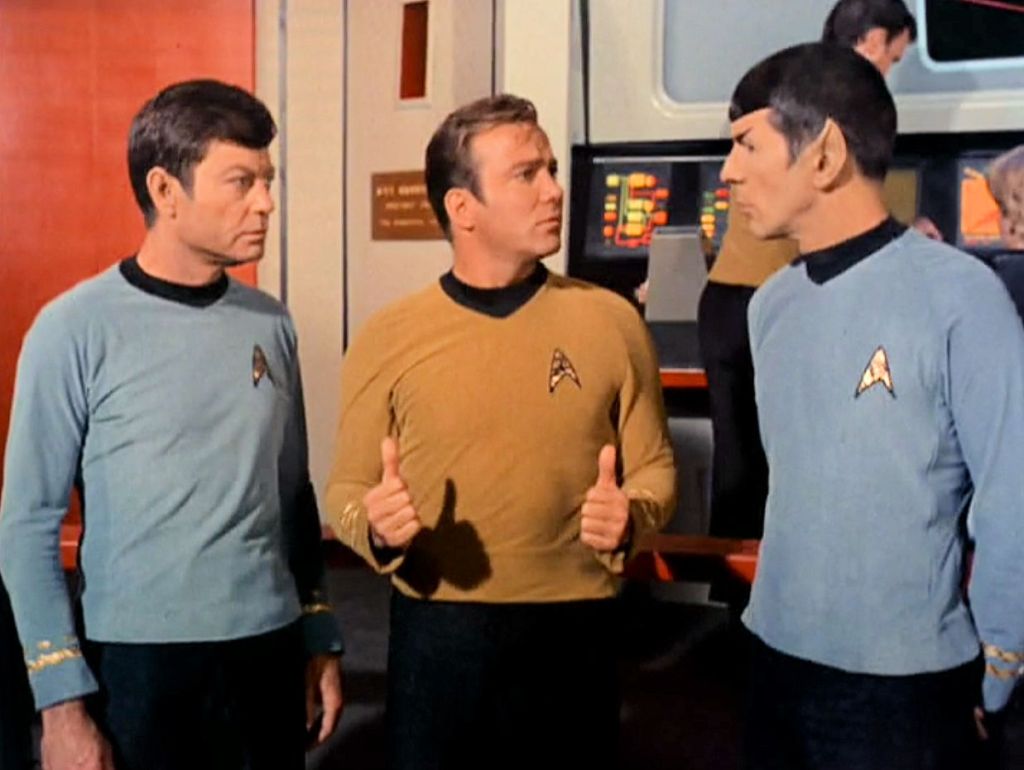
In fairness, Kirk does make a feeble attempt to address the “40% of the action” dilemma. He suggests the collected funds (funds from what?!?) be put into the “Planetary Treasury” (let’s hope that’s nothing like the International Monetary Fund!) to help Sigma Iotia II form “a more ethical system,” remaining conveniently vague on who gets to define ethics for the Iotians. Kirk says, “Despite themselves, they’ll be forced to accept conventional responsibilities,” which sounds a lot like colonization to me. These questions may all be pointless, because in the final scene McCoy admits having left his communicator behind on the planet. The Iotians now possess a transtator, which is apparently more valuable than vibranium, because all of the Federation’s technology is based on it. This puts us right back where we started, and we should have seen it coming: during the prologue, McCoy says, “We’re going down to re-contaminate them.” Instead of taking the lost communicator seriously, like the season two Enterprise episode “The Communicator,” Kirk turns it into a joke. This final laugh may be in keeping with the episode’s humorous intentions, but ending on such a cringe-worthy note doesn’t improve the viewer’s experience. “A Piece of the Action” is a fine attempt, but given the current state of world affairs, there are some things I’m not prepared to laugh about. All this greed and violence, it’s just not funny.
Next: The Immunity Syndrome